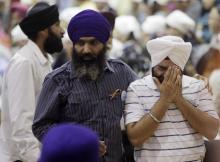senate

I stood in line and waited until they called my number.
“Neeeext,” the woman behind the counter called!
The woman put out an energy that dared anyone to cross her, challenge her, even speak to her. She gave me a pile of papers to fill out “over there,” she waved her hands dismissively in the general direction of all the other losers sitting in rows of old school desks — the kind where the chair and the desk are attached. They were all fully engrossed in one task: filling out their unemployment insurance applications. I joined them.
Of course we weren’t losers, but it felt like we were. We were grown adults. We represented many races: white, black, Latino, and Asian. We represented a small fraction of the sea of people who were out of work at the height of the economic crisis. If you had come to us only weeks before we were school teachers and firemen, opera singers, Wall Street brokers, and justice advocates (like me). But now we were all numbers, experiencing the same humiliating moment together.
But, how much more humiliating it would have been to be thrown out of my apartment? How much more dehumanizing would it have been to become homeless or go without food?

As an icy wind whipped the sides of a packed tent, five activists committed themselves Tuesday to fast from food and drink and to camp in front of the U.S. Capitol until Congress passes comprehensive immigration reform.
“I know that there are going to be difficult days ahead of me,” said Eliseo Medina from the Service Employees International Union. “I know that going without food will not be easy and I know that I will suffer physical hunger."
“But there is a deeper hunger within me, a hunger for an end to a system that creates such misery among those who come here to escape poverty and violence in search of the American dream.”
Religious and labor leaders joined immigration activists at the launch of the “Fast for Families: A Call for Immigration Reform and Citizenship.” Many will participate as “solidarity fasters,” fasting for a shorter time.

“Whoever has two coats must share with anyone who has none; and whoever has food must do likewise.” (Luke 3:11)
Many of us are blessed enough to not know what it is like to be hungry, to regularly miss meals, or to consume a diet void of essential nutrients for a healthy life. But now, millions of our brothers and sisters here in the United States may, sadly, be facing these situations because of a reduction in their food stamp benefits.
Starting Friday, all households receiving food stamp benefits will see their food budgets shrink as a temporary increase expires. A family of four could lose up to $36 a month in food stamps (also known as the Supplemental Nutrition Assistance Program, or SNAP).

An effort to tweak President Obama’s health care reform bill to fill a gap for church health insurance plans could fail because of Republicans’ insistence on repealing the law.
Without a fix, United Methodist Church leaders say some of their churches could drop current coverage for employees once “Obamacare” takes full effect next year, according to Colette Nies, spokeswoman for the UMC’s General Board of Pension and Health Benefits.
Under Obama’s 2010 Affordable Care Act, more than 50 percent of UMC clergy would qualify for tax credits available to lower- and middle-class families to purchase insurance. But because of the way the law was written, those tax credits cannot be used toward insurance plans churches can offer through government-run exchanges.
House Speaker John Boehner, R-Ohio said in an interview with CBS on Sunday that “immigration reform isn’t about him.” Denying CBS’s Bob Corner insight in to his own personal views on immigration, Boehner refused to share details about what parts of the immigration bill he feels should pass the House when it comes time for their final debates. Boehner, who is opposed to granting citizenship for illegal immigrants, claimed the bill which passed the Senate last month will “not pass the House.”
The Guardian reports:
The Senate has passed a sweeping, bipartisan immigration bill that includes a pathway to citizenship, which Republican opponents have called an "amnesty" that would reward lawbreakers and attract more illegal immigrants. Boehner said taking a personal stand on the issue would make it harder for him to find consensus on immigration in the House.
Read more here.
Following Monday’s three hour closed-door caucus, members of the Senate have begun the confirmation process of President Barack Obama’s executive branch nominees, avoiding what the Washington Post calls a "constitutional showdown.” The Washington Post reports:
Senate negotiators met until about midnight searching for a deal that would avert a showdown on the Senate floor. Rank-and-file senators came out of the meeting late Monday reporting progress on the confirmation prospects of Obama’s selections to head low-profile but influential agencies.
Read more here.
The number of those who’ve benefitted from the Supplemental Nutrition Assistance Program (SNAP) has increased nearly seven percent from 8.7 in 2007 to 15.2 in its most recent study. Despite the economic challenges America has faced over the past several years, the Houses’ decision to do away with food stamps has not only caused controversy between the House and the Senate but has caused controversy between the government and the American people. The New York Times reports:
Something terrible has happened to the soul of the Republican Party. We’ve gone beyond bad economic doctrine. We’ve even gone beyond selfishness and special interests. At this point we’re talking about a state of mind that takes positive glee in inflicting further suffering on the already miserable.
Read more here.
With only hours left until the Senate releases the final tally of those in favor of immigration reform, House Speaker John Boehner and others prepare as controversial issues are bound to arise at the July 10 “closed-door” conference. The Daily Beast reports:
The closed-door powwow promises to be an electrifying exercise in spleen venting, thrust upon them by their Senate brethren. At some point in the next day or two, the upper chamber is expected to pass its sprawling, blood-sweat-and-tears-drenched overhaul of our FUBAR immigration system. In the run-up to voting, Hill watchers have been aflutter over whether the bill can pull enough Republican support to hit 70 “yeas”—maybe even 71! A procedural test vote Monday topped out at a mildly disappointing 67 (including 15 Rs). But the last-minute horse-trading continues, and reform advocates remain optimistic that the final tally will be big and bipartisan enough to goose the House into passing something similarly sweeping.
Read more here.

WITH SO MANY of our sacred institutions collapsing from within, it was a relief to hear that all charges have been dropped against an Elvis impersonator from Mississippi, thus sparing his worthy avocation from disrepute. Paul Kevin Curtis had been accused of sending poisoned letters to officials in Washington, D.C., but FBI officials soon came to their senses and realized that anyone who spends time impersonating a celebrity who’s definitely left the building probably couldn’t make a salad dressing with vinegar and oil, much less extract lethal chemicals from exotic plants.
Ricin was the poison in question, and seems to be the current compound of choice for disgruntled letter terrorists. Before that it was anthrax, an easy-to-produce material which, as it turns out, is what happens when you make salad dressing and get the ingredients wrong. A little too much balsamic, a couple nosy neighbors, and pretty soon the FBI wants to chat.
Fortunately, this man was absolved of all wrongdoing, guilty of nothing except the single act that sets him apart as a hallowed foundation of our society, the one institution that has consistently contributed to Americans’ self-esteem. Because as long as there are Elvis impersonators around, the rest of us will always feel happy and fulfilled. All of our important life decisions—some made in haste, others made in desperation, and each one now regretted—seem steadfast and well-considered, because they have kept us from going down the path of a celebrity impersonator.

The Farm Bill might not sound like the most exciting piece of legislation ever to come out of Congress, but it has huge implications for nutrition in the United States. Among other things, the Farm Bill determines support to small farms, promoting farmers’ markets, and, oh yeah, the Supplemental Nutrition Assistance Program (SNAP), what we used to call food stamps.
SNAP is one of the most effective anti-poverty programs, set to expand with increased need and decrease when people no longer need help. Most benefits are modest, and the majority of recipients who are able to work do. In fact, SNAP is effective because it not only helps people get the food they need, but its benefits encourage them to find work.
Unfortunately, it seems like both houses in Congress are set on changing the SNAP program for the worse. Putting aside the cuts the House has planned for nutrition assistance that would kick 2 million people off the program, the Senate recently accepted a change to SNAP that flies in the face of the criminal justice system and will probably have racially discriminating effects.
Tuesday the Senate Agriculture Committee passed a new five-year farm bill. The bill cuts subsidy payments and the food stamp program while expanding crop insurance. The Senate bill will reduce spending by $24 billion over 10 years. The bill passed 15-5 in committee with a full Senate vote expected later this month. USA Today reports:
The farm bill passed on Tuesday eliminates $17 billion in farm subsidies, $5 billion a year in direct payments given to farmers regardless of need and reduces $4 billion from conservation programs largely through consolidation. Spending for food stamp programs, used by 48 million Americans, also would be cut by $4 billion.
Read more here.
The Gang of Eight is banding together across party lines to fend off attacks to the guest worker program in the immigration bill. Members of the gang have been working behind the scenes to ensure only amendments they support are proposed. This has upset Democrats and Republicans who feel the bipartisan coalition has too much power over the immigration bill. Politico reports:
"One of the things that most upsets the American people about Washington is drafting a bill with special interests in secret and jamming it across the finish line in a way that minimizes public involvement and input,” Sen. Jeff Sessions (R-Ala.) said recently. “This legislation needs improvement and openness.”
Gun control advocates are escalating their campaign toward senators who voted against the proposal to extend background checks. The campaign includes letter-writing campaigns, protests at town hall meetings and television ads. Several senators inclucding Sen. Kelly Ayotte (R-N.H.) and Sen. Jeff Flake (R-Ariz.) have seen their poll numbers plunge since voting against the proposal to extend backgroun checks. The Los Angeles Times reports:
"The outside game is about convincing those who voted no that they've made the wrong choice. And that is happening. There are definitely second thoughts out there," said Jim Kessler, a gun policy expert at the centrist Democratic think tank Third Way. Senators who opposed the agreement, he said, "expected the politics to work for them after the vote and so far it hasn't."
Read more here.

I hear it over and over again both during my conversations on the road, and as I skim the headlines each day, that we are in a battle for the common good.
I learned about the Boston bombings as my plane landed in Portland, Ore., traveling for an 18-city book tour to spark a conversation on “the common good.” As I read and watched more about the tragedy, there unfolded such a stark and brutal contrast between the explicit intent to kill, hurt, and maim others, and the actions of those who rushed toward the blast, risking their own lives to help the wounded. One act of vicious violence was aimed to destroy the common good and create a society based on fear. The others displayed the highest commitment to redeem the common good and insist that we will not become a nation based on fear, but on mutual service and support.
When real or imagined grievances combine with rage, religious fundamentalism, political extremism, mental illness, or emotional instability, we lose the common good to dangerous violence, fear, and deep distrust in the social environment. But when grievances lead to civil discourse, moral engagement, and even love and forgiveness, different outcomes are possible.

I just spent a wonderful and encouraging weekend with a church leadership team from Reisterstown, Md. I came away filled with hope for this congregation and with admiration for their clergy and lay leaders.
I wish our weak and tiresome political leaders in Washington and state capitals could visit this church in northern Baltimore County and see how mature adults of diverse backgrounds and viewpoints manage to put the congregation first.
They listened, spoke without barbed words and without aggression garbed in niceness.
They voiced their dreams, heard their differences, and then allowed a consensus dream to emerge. They understood the need to move on from yesterday. They were like two healthy parents trying to work a family problem. They seemed to trust each other.

Last week a group of senators released principles for immigration reform that would make the path to citizenship for over 11 million immigrants contingent upon more border security.
That is simply a bad idea. It binds together immigration and threats to national security as one in the same. This mindset should be questioned and rejected, and, even more, it infringes upon the heart and soul of Christianity — to boldly love thy neighbor.

It was the biggest story inside the Beltway. Since last Thursday’s hearing, the whole Washington media machine has been discussing and dissecting the extraordinary confrontation in the Senate Armed Service Committee regarding the potential confirmation of former Sen. Chuck Hagel as the new Secretary of Defense. Several Republican senators were extremely combative with the combat veteran who earned two Purple Hearts for his wounds in Vietnam. Hagel deserves another Purple Heart for the wounds his former “friends” and party members tried to inflict upon him. Hagel didn’t really defend his views — which were both caricatured and attacked by his adversaries — perhaps on White House advice not risk further debates before being confirmed.
But I think Hagel’s views and the important questions he has raised about current U.S. wars and military policy deserve defending and, indeed, should become the subjects of a national debate. So I wrote a piece about one of Hagel’s most hostile questioners who insisted the possible new Secretary answer the simple question of whether the surge in Iraq was “right” or “wrong.” I said it was wrong, as was the war in Iraq, as was the war in Vietnam, as are the views of John McCain on war throughout his entire political career; and how the nation has been wounded by McCain’s and others’ “theology of war.”
Chuck Hagel’s views could lead us to a necessary national debate if he becomes the new leader of the Pentagon. And it is that potential debate that Hagel’s critics are so afraid to have.

Three Buddhists, a Hindu, and a “none” will walk into the 113th Congress, and it’s no joke. Rather, it’s a series of “firsts” that reflect the growing religious diversity of the country.
When the new Congress is sworn in next January, Hawaii Democrat Tulsi Gabbard, an Iraq war veteran, will represent the state’s 2nd Congressional District and will become the first Hindu in either chamber on Capitol Hill.
The 31-year-old Gabbard was born in American Samoa to a Catholic father and a Hindu mother, and moved to Hawaii as a child. She follows the Vaishnava branch of Hinduism, which venerates the deity Lord Vishnu and his primary incarnations.
Gabbard takes over the seat held by Rep. Mazie K. Hirono, who won a Senate race on Nov. 6 and will become the first Buddhist to sit in the upper chamber. There were already two other Buddhists in the House of Representatives, both of whom won re-election: Rep. Hank Johnson, a Georgia Democrat, and Rep. Colleen Hanabusa, a fellow Hawaii Democrat.
OMB Watch reports that the lame-duck Senate may move forward on a bill that could hamstring the SEC as it works to fight fraud and implement financial regulatory reform, tying up the agency in needless red tape and lawsuits:
A pending anti-regulatory bill that targets independent regulatory agencies would significantly curtail the Securities and Exchange Commission's (SEC) ability to protect investors from financial fraud and other economic hazards. The Independent Agency Regulatory Analysis Act of 2012 (S. 3468) would require independent agencies to conduct formal cost-benefit analyses for all significant rules and would allow the Office of Information and Regulatory Affairs (OIRA) to review those analyses. This would cause lengthy delays in implementing the financial oversight contained in the Dodd-Frank law. The Senate Committee on Homeland Security and Governmental Affairs (HSGAC), chaired by Sen. Joe Lieberman (I-CT), may mark up this bill during Congress’ upcoming lame-duck session, even though no hearings have been held on the bill.
The bill would also hamper the essential work of the FDIC, the Commodities Futures Trading Commission, and other government watchdog agencies.
Elizabeth Palmberg is an associate editor of Sojourners and tweets @ZabPalmberg.

U.S. Sikhs are taking heart in a widely publicized Senate hearing on hate crimes and a pledge by the Justice Department to consider tracking hate crimes directed at their community.
The hearing, on Sept. 19, featured Harpreet Singh Saini,18, whose mother was one of six Sikh worshippers killed Aug. 5 when a gunman opened fire in their Wisconsin gurudwara (house of worship or, literally, "house of the guru").
“Senators, I came here today to ask the government to give my mother the dignity of being a statistic,” he told a subcommittee of the Senate Judiciary Committee. “My mother and those shot that day will not even count on a federal form. We cannot solve a problem we refuse to recognize.”
Sikhism, a monotheistic faith founded in South Asia, is the world’s fifth largest religion with an estimated 200,000 to 500,000 adherents in the U.S. Male Sikhs often keep their uncut hair bound up in a turban.
The Senate hearing, spurred by the Wisconsin shooting, brought more than 400 people to Capitol Hill, most of them Sikhs.